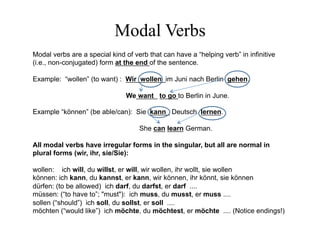Melden
Teilen
Downloaden Sie, um offline zu lesen

Weitere ähnliche Inhalte
Was ist angesagt?
Was ist angesagt? (20)
PERFEKT - THEORIE UND BEISPIELE - PRÄTERITUM VON "SEIN" und "HABEN"

PERFEKT - THEORIE UND BEISPIELE - PRÄTERITUM VON "SEIN" und "HABEN"
How to conjugate German modal verbs in the present tense

How to conjugate German modal verbs in the present tense
Andere mochten auch
Andere mochten auch (20)
Imran SAF - Schenker Sparkling Star Certificate May-2015

Imran SAF - Schenker Sparkling Star Certificate May-2015
k31 Modal Verbs
- 1. Modal Verbs Modal verbs are a special kind of verb that can have a “helping verb” in infinitive (i.e., non-conjugated) form at the end of the sentence. Example: “wollen” (to want) : Wir wollen im Juni nach Berlin gehen. We want to go to Berlin in June. Example “können” (be able/can): Sie kann Deutsch lernen. She can learn German. All modal verbs have irregular forms in the singular, but all are normal in plural forms (wir, ihr, sie/Sie): wollen: ich will, du willst, er will, wir wollen, ihr wollt, sie wollen können: ich kann, du kannst, er kann, wir können, ihr könnt, sie können dürfen: (to be allowed) ich darf, du darfst, er darf .... müssen: (“to have to”; "must"): ich muss, du musst, er muss .... sollen (“should”) ich soll, du sollst, er soll .... möchten (“would like”) ich möchte, du möchtest, er möchte .... (Notice endings!)